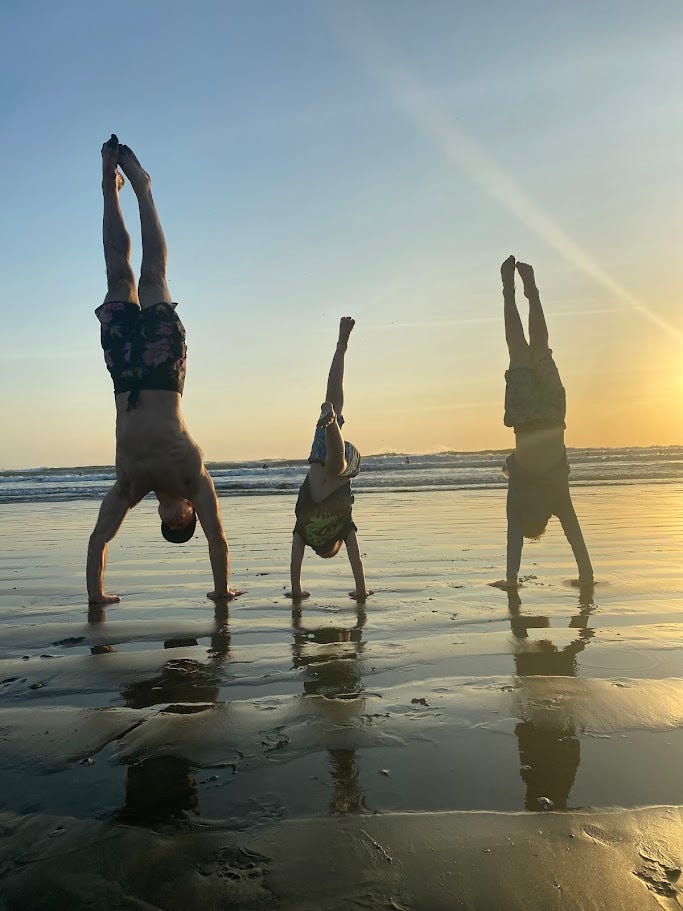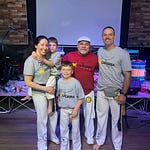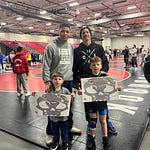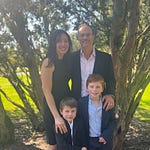🔥Welcome to Volume #00119!🔥
I’m Christian Champ. This is ☯️The Middle Way Newsletter ☯️. It is a place where I write, explore, share, and invite you along for the journey.
If you enjoy the newsletter, please share it with your friends.
💧Why We Need to Leverage Our Drops💧
Champ Up!
Instantaneously, my body responds.
There is no pause, no trepidation. Locked in and ready.
I feel the power of the wave as my feet touch the board. The water sprays at my back.
My head faces down the line to the right. The excitement increases with each micromovement.
It all starts with the drop in. If you miss the drop, you can't surf the wave. If you miss the drop, you have nothing. If you miss the drop, you get pounded on by the wave you missed and the waves that follow.
The day is big and I need to make the drop.
My surfing game consists of six to seven days a year, with a bonus session or two if I make it to LA and things align.
I’m not a good surfer. But for someone who gets six or seven days in a year, I’m focused on always getting a little better. Surfing is one of those things I try to improve every time I’m in the water.
The one thing I can do well after surfing for seven days a year for thirteen years is making the drop. The faster and bigger the wave, the more confident I am that I can make the drop.
My paddling and positioning are not strengths, so the less I need to do, the better my odds of success. I don’t fear the drop, no matter how big the wave. Maybe it’s irrational confidence, but that belief means I get more reps in my limited time on the water.
Last year, I wrote about my shortcomings in the water, but I did include a photo of me nailing a BIG DROP IN!
This year, I reflected on my strengths and thought about how we can all use our strengths to advance faster.
We need to figure out how to leverage our key strengths to get more reps, more live training, and level up.
That is what making our drops is all about: finding the key moments where we turn it on, go to the next level, and using that momentum to propel us forward.
When I catch waves, I use a surf coach. With limited time in the water, my ability to read waves — which to take, which direction to go, and when to stand — isn’t great. My coach Jordy calls it out: which wave, which way, when.
Purists might call it cheating. But the result? I catch ten waves a session, versus two or three if I go solo. More reps, more growth. More time going live vs. time paddling and positioning.
The blueprint for finding our drops starts with knowing our leverage points and applying constraints to maximize our advantages to get better.
LEVERAGE POINTS
What is the thing that gives us the most bang for our buck to improve?
The drop in other things can start with time under tension. If we are learning jiu jitsu, our leverage point starts with time on the mat and being calm. Once we can be calm, we create the conditions to find more ways to attack and to escape from our opponent's attacks.
In a work meeting, our leverage point can be understanding the needs and desires of our colleagues so that we can start to propose solutions that solve their issues. Or our leverage point is summing up the desires of a group so that folks trust us and see our acumen.
Our leverage point when coaching our children's sports teams can be our ability to gain trust and create an environment where kids increase their focus and effort because of that trust.
Know thyself is the key to understanding our leverage points. And yeah, we don’t have one, we have many. The game is to create more and more leverage points that drive a kaizen situation... aiming for continuous improvement.
We find our leverage points by deconstructing the areas where we want to improve. We find the moments that push us into successful outcomes. We notice what moves us forward — and what stalls us out. We see where the energy comes from and when it dissipates. We then create the conditions to capture that energy.
The Drop Framework
1. Identify your leverage point
The thing that gives you the most growth per rep.
2. Constrain for success
Use tools, coaches, postitions, or systems to get more reps.
3. Ride the wave
Build momentum through continuous improvement (kaizen).
When we create the leverage points, we surf more waves. We put more points on the board. We find our flow.
Which leverage points do we need to recognize — and put ourselves in front of — to catch more waves?
The more drops, the more flow.
Let’s get better at making our drops.
🧠Things to Think About🧠
George Mack on High Agency in 30 minutes
What we ultimately want is to be agency. Mack breaks down what makes someone high agency and ways to become high agency.
According to Mack, high agency people do these kind of things, which makes me exteremly biased to his definition, checking most of these boxes.
Weird teenage hobbies
Treadmill energy
Quit something of prestige
You can never guess their opinion
Immigrant mentality
Sends you niche content
Quit something of prestige
They don’t trust. They verify
Self-taught learning machines
They question the question
He defines high agency as combining these three skills.
High agency can be a confusing idea to understand because it’s not just one idea. It’s a combination of three distinct skills rarely found together:
Clear thinking
Bias to action
Disagreeability
High agency is like a tricycle. If you remove one of the wheels, it stops working.
His high agency tools show us the way to becoming more high agency. My favorite is the story razor.
The Story Razor
If stuck between two potential options, ask: What is the best story?
"Life is a form of self storytelling. We're continually retelling ourselves our life story, but very few people think of themselves as authors of their story, not mere subjects. People with extraordinary high-agency realize this early in life and start maximizing the interestingness of their life story.
Having a fascinating life story is not just an exercise in vanity -- it has a real impact on your success in life. You'll have an easier time attracting friends as well as life and business partners. It'll also make it much easier to sell yourself or your products. It has a kind of compounding halo effect
So next time you're faced with a tough decision, consider the path that makes a more interesting story. If it turned out to be the wrong decision to have made, you'd at least be fun at dinner parties.” - Amjad Masad
Do it for the plot. And most importantly — don’t go back to the carpet store.
My journaling buddy Peter Limberg writes about his experience Unleashing the Power Within with Tony Robbins
The entire 5,500 word piece is a great read. What I like most is how Peter dances during the good parts of the days and notices what doesn’t work for him and what he doesn’t believe in (upselling!). Instead of being entirely cynical he takes a skeptical view and embraces what works and acknowledges what doesn’t.
Tony was telling us to say our limiting beliefs out loud, associating this feeling with them. Then, changing tone, Tony asked us if these beliefs were really true, cueing a shift in the process. I said “no.” He kept asking. I barked, “No!” He asked us to shout out our response, and I raised my arms triumphantly and yelled, “FUCK NO!”
I cannot remember what happened next, but it felt orgasmic. We danced, power posed, yelled, and emotionally committed to a life without these beliefs.
Now, we were going to install the empowering beliefs, which were the antithesis of the limiting ones. But first, we really had to remove any trace of them. The exercise was goofy, but we had to stick our finger in our nose and say the old belief in a cartoonish way, then rip our finger out of our nose and say, “Bullshit.”
It was fun.
We wrote out our new empowering beliefs and took time with each one, shouting them with joy, with a smile on our faces, really feeling into them. I was walking in circles around my office, strutting like Conor McGregor—proud, confident, gorilla-like—declaring the man I was becoming. The man I am now.
All the feelings of cheesiness were fading from me. I could feel the energy of 60,000 people with me. It felt like one big beautiful party, where we were punching through all the bullshit that had been holding us back. The beliefs we didn’t ask for. The ones that were imposed on us.
We installed the final belief. It felt awesome. Pump-up song after pump-up song played. Tony was going wild. And dancing. I like dancing now. I dance better with these new beliefs.
In the end it was worth it for Peter to partcipate. He took the good from it and ignored what didn’t work for him.
🎧Things to Listen, See, and Watch 🎧
Spending more and more time home schooling my children and trying to level up my skills before the ride is over, lots of time is spent on how do we learn better. Bren leaves us with how can we create tasks for learning
Training Environment Design: Effective learning environments should be rich in movement information. Instead of prescriptive instructions, creating tasks that immerse students in relevant movement contexts leads to better learning outcomes.
Movement-Based Learning: Instructors should avoid isolating movements from their context. Instead, tasks should involve natural, multimodal movement information, especially when teaching functional movements, such as wrestling techniques.
Focus on Function, Not Technique: Instead of focusing solely on technique details, instructors should allow students to engage with tasks that challenge them in real-world contexts, which accelerates learning.
Michael Garfield has on Jim O’Shaughnessy for a fruitful discussion. The link to the video and subjects dicussed is here.
Navigating Paradoxical Times
We live in a time of rapid technological advancement, creating a paradox where increased capability coexists with uncertainty and fatigue.
This leads to herd mentalities that hinder adaptation or reckless pursuits of individual gain.
The key lies in embracing active participation and radical creativity while acknowledging that every solution births new problems and change is constant.
Human strength lies in balancing individual distinction with collaborative intimacy, rejecting zero-sum games for collective intelligence.
Trusting the process, taking calculated risks based on game understanding, and prioritizing long-term sustainable engagement are crucial.
Act, Don't Just Talk
To change the world, act, don't just talk.
Take action, embrace failure as a learning opportunity, and let success emerge from multiple attempts.
Self-Reflection with AI
Use AI tools like ChatGPT to challenge your beliefs and identify blind spots.
Continuously testing your ideas, even if not adopted by everyone, leads to valuable insights.
💣Words of Wisdom💣
"You learn best by reading a lot and writing a lot, and the most valuable lessons of all are the ones you teach yourself." (Stephen King, On Writing)
"Focus on What Really Matters … Today and Tomorrow The vision of the eagle says this: If this won’t matter in an hour, a day, a week, or even a year, why should I allow it to matter now?" (Matthew Dicks, Someday Is Today)
"Sometimes we feel that as long as we are working hard, we are getting better. This is often not the case." (Heroes of the Art, The Danaher Diaries)
"Beliefs seem like perfect representations of the world, but, in fact, they are imperfect models for navigating a complex, multidimensional, unknowable reality." (Dave Gray, Liminal Thinking)
"No matter what skill you set out to learn, the pattern is always the same: See the whole thing. Break it down to its simplest elements. Put it back together. Repeat." (Daniel Coyle, The Little Book of Talent)
"The most significant criteria to use when selecting travel companions is: do they complain or not, even when complaints are justified? No complaining! Complaints are for the debriefing afterwards when travel is over." (Kevin Kelly, 50 Years of Travel Tips)
"Hire Drivers, Not Passengers, and Get the Wrong People off the Bus" (Frank Slootman, Amp It Up)
"In its purest form, inexperience erases fear. You do not know what is and is not possible and therefore everything is possible." (Twyla Tharp, The Creative Habit)
"Innumerable confusions and a feeling of profound despair invariably emerge in periods of great technological and cultural transition." (Douglas Coupland, Marshall McLuhan)
"We live so much of our lives pushed forward by these "if only" thoughts, and yet the itch remains. The pursuit of happiness becomes the source of our unhappiness." (Dan Harris, 10% Happier)
"Learning to exist with this vagueness is vital, especially at the earliest stages of making a change. It’s worth it though, because as Callard says, what is really at stake is you are “learning to see the world in a new way.”" (Paul Millerd, The Pathless Path)
"When you are uncertain, you only have two choices: you can pretend to know, or you can tell the truth. If you want to be the hero of your own story, you have to be empowered to say three brave words: I. Don't. Know." (Julia DiGangi, Energy Rising)
"Purpose is an infinite value. That is to say, a deeper, more profound sense of purpose is always infinitely available. Money is a finite value." (Bryan Franklin, Michael Ellsberg, The Last Safe Investment)
"As New York Times columnist David Brooks recently observed, American culture today is based on the premise "that career and economic success can lead to fulfillment," an assumption that Brooks calls "the central illusion of our time."" (Leonard Sax, The Collapse of Parenting)
"His point was, in complete agreement with Gurdjieff, that we have gotten dangerously out of balance. That in our overemphasis of intellect, our minds have, in fact, become duller, less capable of working efficiently." (P. T. Mistlberger, Three Dangerous Magi)
"IN MY OWN CASE, when I look back to when I was in school, the biggest saving grace for me was having some close friends, and reading tons of books. (Haruki Murakami, Novelist as a Vocation)
"Early on, he'd recognized the inherent mystery of this process, and the power of preserving that mystery, or even further obscuring it. "Mystery is a word for a reason," he said. "It has a purpose."" (Prince, The Beautiful Ones)
"An Essentialist produces more—brings forth more—by removing more instead of doing more." (Greg McKeown, Essentialism)
🙏Thanks for Reading🙏
What leverage points do we need to use to create the growth and learning we want?
Namaste,
Christian
Another year of sunset handstands in Nosara, Costa Rica













